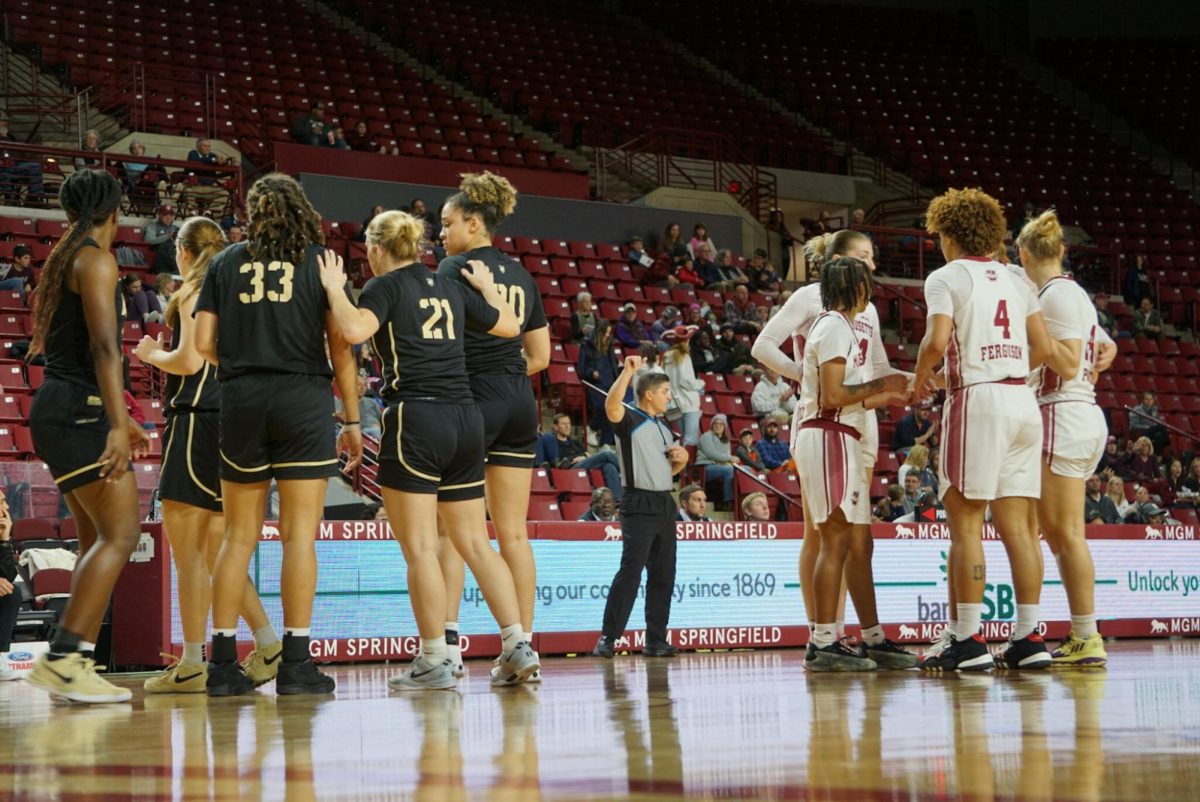
On Tuesday evening, Marilyn Chin, a prominent contemporary Chinese-American poet, read her work at the Helen Hills Hills Chapel at Smith College.
With her powerful language and enthusiastic disposition, Chin spread laughter and awe across a crowd of around 100 students, professors and locals.
Her delivery was loud, sassy and proud. While she read some of her most popular work such as the snarky “Bad Girl Haiku” and the thought-provoking “Autumn Leaves” – which had been featured on poetry placards on New York City subways – some audience members were on the edge of their seats, grabbing at their hair and biting their nails to the humorous yet heart-wrenching words.
Chin describes herself as an “activist poet.” Born in 1955, she grew up in Portland, Oregon after emigrating with her family from Hong Kong. She received her Bachelor of Arts from the University of Massachusetts Amherst and her Master of Fine Arts from the University of Iowa. Her poetry explores social issues such as “Asian American feminism and bi-cultural identity.” It is “taught in classrooms internationally” and is featured in anthologies such as “The Norton Anthology of Modern and Contemporary Poetry.”
Chin has repeatedly been commended for her work on racial inequality, feminism and social justice. Her poetry awards include those “from the Radcliffe Institute at Harvard, the Rockefeller Foundation, and the National Endowment for the Arts.”
In 2015 she won the Anisfield-Wolf Book Award for “Hard Love Province,” her fourth collection of poetry that “mourns the loss of a beloved in a world that seems inured to suffering,” according to the Anisfield-Wolf Book website. Each year the Anisfield-Wolf Award honors writers who “heighten perceptions on race and diversity.” Previous winners of this award include Langston Hughes, Malcolm X and Martin Luther King Jr.
Tuesday’s event opened with readings by the finalists and winner of the 10th annual High School Poetry Prize. Judged by Chin herself, this competition selects five “sophomore and junior girls in New England.”
Mirushe Zylali read her winning poem, “Diaspora Anaphora,” a stylistically advanced poem that challenges ethnic history in America. As Zylali confidently recited the last two lines of her poem, “whose building foundations are made from the headstones of your ancestors: / ‘We live here now. Go back to where you came from,’” she fearlessly gazed directly into the crowd.
Madison Chafin, a third-year student studying poetry at Smith College who facilitated the event with The Poetry Center at Smith College, introduced Chin, calling her a “poet of contradictions who is profoundly important and lyrical.”
“Chin discusses a lot of different subjects, moving from place to place like a journey,” said Elizabeth McCormack, a fourth-year student who also studies poetry at Smith. “Her poetry is simultaneously a violent and passionate journey.”
Inclusive of both ancient and contemporary worlds, Chin’s poetry is a forceful dialogue of cultural assimilation. In sonnet’s like “Brown Girl Manifesto” and “Black President,” she challenges strict classical styles of poetry while manipulating images and phrases by classic poets such as John Keats and Rudyard Kipling. Grounded in the traditions of poetry as well as Chinese culture such as Buddhism, her monologues challenge and innovate the controversial topics she boldly tackles with a personal touch.
“I love to subvert and pervert the tradition,” Chin said before reading her sonnet “Brown Girl Manifesto,” which uses extra beats she says are influenced by hip-hop. Other poems influenced by music include “Blues On Yellow,” a poem on racial empowerment she explained is inspired by a year of studying jazz artists like Miles Davis.
“She really puts the listener’s soul into these abstract sociological concepts,” said Miles Weber, a third-year social thought and political economy major from UMass. “When you read these poems they seem so dark and gloomy but when you put a face to them they become a different experience.”
Marilyn Chin has taught at the Iowa Writer’s Workshop and has been a guest poet at many international universities. Currently “she is writing a book of poetic tales” and co-directing the MFA program at San Diego University, where she teaches English and Comparative Literature.
Rachel Ravelli can be reached at [email protected].



















marilyn chin • Feb 25, 2016 at 9:21 am
Thanks, Rachel, for such a generous article. I feel so beloved! Happy Chinese New Year!